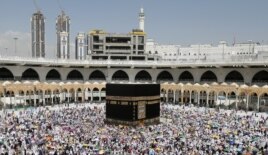23 June 2020
A Saudi official has said only a few thousand pilgrims can attend the Muslim religious observance known as the hajj next month. Concerns over the spread of the coronavirus mean that fewer people can come to the Muslim holy city of Mecca. The hajj usually brings up to 2.5 million Muslims to the Saudi city from all over the world. The pilgrimage begins in late July.
Saudi's Hajj Minister Muhammad Benten said a "small and very limited" number of people can come to perform the pilgrimage, possibly only 1,000 from the Saudi kingdom.
"The number, God willing, may be in the thousands. We are in the process of reviewing so it could be 1,000 or less, or a little more," Benten said in an online news conference.
The decision to cut the number of people for this year's hajj was expected although it has never happened before in Saudi Arabia's nearly 90-year history. It bars nearly all Muslims from outside the kingdom from traveling there.
The Saudi government waited until five weeks before the hajj to announce its decision. The timing shows the sensitivity around major decisions concerning the hajj, which affect Muslims around the world.
"This is a very sensitive operation and we are working with experts at the Health Ministry," Benten said. He said protecting the lives and health of pilgrims is important.
Saudi officials said that no one over the age of 65 will be permitted to perform the hajj. They also said everyone involved in the hajj this year will be quarantined before and after the pilgrimage.
Saudi Arabia first announced late on Monday that only a few Muslims could come to Mecca. It said they would be chosen from among people of many nationalities already inside the kingdom.

FILE - Muslim pilgrims perform the final walk around the Kaaba (Tawaf al-Wadaa), Islam's holiest shrine, at the Grand Mosque in Saudi Arabia's holy city of Mecca on August 13, 2019.
It is disappointing for Muslims who have saved money for years to pay for the trip. Making the hajj at least once is a requirement for all Muslims. It is also a chance to remove sins and to form relationships with Muslims from all over the world.
"It is a wish of every Muslim to perform hajj, but because of COVID-19, it will not be possible this year," Chairman of the Islamic Centre of India Maulana Khalid Rashid said.
Rashid is one of India's most influential Muslim clerics. He said that a group of Indian Muslims should be permitted to go and perform the hajj.
"The tradition should not be broken," he said.
Usually, each country is given a set number of hajj visas that are decided by the size of its Muslim population. Indonesia, the largest Muslim country, gets 221,000.
Pakistan usually sends around 180,000 pilgrims. Pakistan said Saudi officials already told them about the decision to limit this year's hajj. Pakistani diplomats already in Saudi Arabia will represent the country this year at the hajj.
Saudi Arabia's borders have been shut to foreigners since late February in attempts to slow down the spread of the virus.
Still, the kingdom has one of the highest infection rates in the Middle East, with more than 161,000 confirmed cases so far, including more than 1,307 deaths.
Saudi Arabia said the decision to limit the hajj agrees with the teachings of Islam, which require the preservation of human life.
I'm Bryan Lynn.
The Associated Press reported this story. Susan Shand adapted it for Learning English. George Grow was the editor.
________________________________________________________________
Words in This Story
pilgrim–n. one who undertakes a religious journey
review–n. to look over
quarantine–n. the isolation of someone who has a contagious disease
sin–n. to commit a bad act that is condemned by one's faith
cleric–n. a religious man or woman